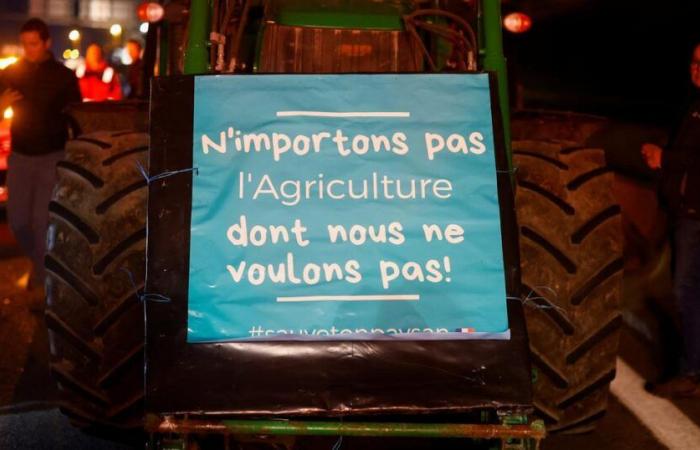AGRICULTURE – Several major European producing countries denounce the proposed free trade agreement between the EU and the Latin American countries of Mercosur. For the German Farmers' Association (DBV) “it is urgent to renegotiate» this agreement.
Agricultural organizations from major European producing countries such as Germany, Italy, Poland and Spain are denouncing the proposed free trade agreement between the EU and the Latin American Mercosur countries. But the response of their governments is more nuanced than that of France, which remains the most vehement in its opposition.
While Mercosur would primarily export agricultural products to the EU (beef, poultry, pork, honey, sugar, etc.), there is serious concern about conditions of competition deemed unfair, with these foods not meeting to the same environmental and social standards as in Europe, and even health standards in the event of faulty controls.
Copa-Cogeca, the majority European trade union organization, called on the EU to “goodbye» this project and “defend a commercial policy bearing the rigorous standards of our agriculture».
Several mobilizations planned in France
The mobilization is particularly strong in the continent's leading agricultural country in terms of value. A vast mobilization is announced from Monday, against a backdrop of the general crisis in agriculture.
«An EU audit report has just revealed flaws in Brazil's procedures for monitoring compliance with health standards», Underlines the National Bovine Federation. “Despite this, the European Commission is continuing with conviction the negotiations which will promote additional access for 99,000 tonnes of South American beef.».
Paris is trying to rally other states, such as Poland, to build a blocking minority within the EU.
Germany calls for renegotiation
Germany, reluctant to agree to the agreement under Angela Merkel due to deforestation in the Amazon, changed sides with Olaf Scholz, wishing to expand its industrial outlets. Today, the collapse of the government coalition leaves farmers waiting. For the German Farmers' Association (DBV), the main union, “it is urgent to renegotiate» this agreement.
Il «would lead to replacing national production with imports meeting last century standards, to the detriment of consumers, farmers, animals, the environment and the climate», explains Joachim Rukwied, its president, for whom “EU agriculture can only survive if mechanisms compensate for the differences between international and European standards“. No official demonstration is planned, which should not prevent convergences on the Franco-German border, as on the Franco-Spanish border.
Spain denounces agreement “outdated and inconsistent»
In Spain, all the major agricultural unions have expressed their fears, particularly for livestock farming. This agreement is “outdated and inconsistent», for the Asaja organization.
No mobilization has been announced, but the concern aroused by the project had weighed on the angry movement of farmers at the start of the year. However, the government of socialist Prime Minister Pedro Sánchez has come out in favor. He is “strategically necessary», assured the Minister of Agriculture Luis Planas in mid-October: some sectors could suffer, like the beef sector, but others would benefit, like wine and olive oil.
Italy is worried
The large organization Coldiretti wrote to Prime Minister Giorgia Meloni to express the “deep concern» with regard to an agreement which “would have devastating effects on the agri-food sector».
«We believe that close collaboration with other EU member states, such as France, who share our concerns, can prevent the agreement from being adopted in its current form», calls the letter.
In the Netherlands, the poultry sector and sugar under threat
The main agricultural union LTO calls “to stop the negotiations“. In the Netherlands, the poultry sector and sugar would be threatened, explains Klaas Johan Osinga, political strategy advisor of the LTO to AFP. “The agreement could however be good for the cheese sector, be an opportunity for horticulture, but these are relatively small sums», He adds, noting that the four parties in the government coalition are divided on the subject.
Poland calls for “to block» the project
The Ministry of Agriculture expressed its “serious reservations» with regard to a project which “will perhaps have some benefits for industry, maritime transport and certain services, at the expense of most segments of agri-food production».
One of the main agricultural organizations, NSZZ RI Solidarnosc, called on the head of government Donald Tusk to go further and “to block» the project.
In Austria, a resolution against
The parliamentarians of the National Council adopted a resolution against, recalls the Ministry of Agriculture: “Restricting agricultural production in Europe via ever more stringent standards while pushing for old-school trade agreements is not compatible. Austria is an export-oriented country, we want the game to be fair“. Such imports without customs duties “endanger our agriculture», summarizes the first agricultural association (Bauernbund).
Ireland protests
While in Ireland the legislative elections at the end of November are focusing attention, the representatives of the breeders (ICSA) protested in front of the lower house of Parliament.






